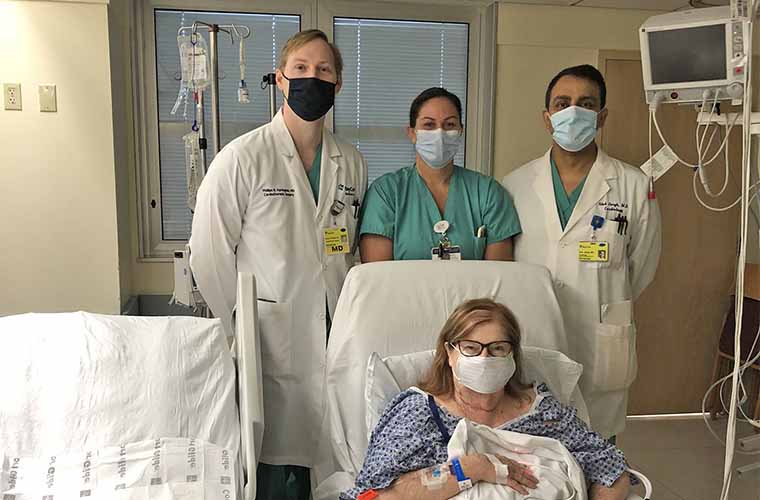St Joseph's Hospital Structural Heart Team Performs Rare Valve Replacement Procedure

Joanne Smith is no stranger to heart surgery; however, transcatheter mitral valve replacement (TMVR) was a unique experience. That’s because, when the structural heart team at St. Joseph’s Hospital’s Heart Institute conducted the procedure on Joanne, it was the first time on the west coast of Florida that TMVR had been used in a patient’s heavily calcified native valve with severe mitral stenosis. In fact, Phillips Harrington, M.D., and Alok Singh, M.D., who performed the surgery, had to reinvent the wheel, so to speak.
BayCare health system was the first to bring the Transcatheter Aortic Valve Replacement (TAVR) procedure to the Tampa Bay area in 2012. Currently there are structural heart programs at three BayCare hospitals – St. Joseph’s Hospital, Morton Plant Hospital and Winter Haven Hospital. In fact, Smith had that procedure in 2014 at St. Joseph’s Hospital.
TAVR is an alternative procedure to open heart surgery for some patients suffering with aortic stenosis (AS), a progressive condition where the aortic valve of the heart hardens and narrows, impacting the heart’s ability to move blood from the heart to the brain and body. Mitral stenosis, which was Smith’s issue is a narrowing of the mitral valve opening and causes reduced blood flow through the narrowed valve opening from the left atrium to the left ventricle. As a result, the volume of blood bringing oxygen from the lungs is reduced.
The TAVR minimally invasive procedure enables the placement of a new balloon-expandable or self-expandable aortic heart valve into the body through the leg or chest by a catheter-based delivery system. The valve deploys inside of the diseased valve, replacing it with a new valve that opens and closes appropriately.
Because a catheter-based valve for the mitral position is not commercially available, but in trials, Drs. Harrington and Singh used an existing aortic valve in an upside-down position. It was the only valve that was able to attach to the calcification in Smith’s faulty valve.
TMVR is considered to be an “off-label” procedure. Even though it has been performed at other facilities and has been proven effective, it is not automatically covered by insurance. Smith and her team worked for a year to find a plan that would cover the procedure.
At the age of 79, this was Smith’s third heart procedure. Because she had already undergone emergency heart bypass surgery and subsequent TAVR procedure, Drs. Harrington and Singh decided that the TMVR procedure would be the best treatment for Smith.
Since undergoing the TMVR procedure Sept. 3, Smith’s condition has improved. Prior to the surgery, she was not able to be very active. “I had shortness of breath just walking out to mailbox,” she said. “I have stairs to climb at work and I would have to stop in the middle to catch my breath.” Like many people, Smith is working from home now because of the coronavirus. She uses a cane to prevent falls and soon will begin cardiac rehabilitation.
Smith’s cardiac journey began seven years ago with a heart attack disguised by nausea and vomiting. Studies show that some women never experience chest pain, either leading up to or during a heart attack. Women are somewhat more likely than men to experience some of the other common symptoms, particularly shortness of breath, nausea/vomiting and back or jaw pain.
The American Heart Association recommends that, if you have any of these signs, call 9-1-1 and get to a hospital right away:
- Uncomfortable pressure, squeezing, fullness or pain in the center of your chest. It lasts more than a few minutes, or goes away and comes back.
- Pain or discomfort in one or both arms, the back, neck, jaw or stomach.
- Shortness of breath with or without chest discomfort.
- Other signs such as breaking out in a cold sweat, nausea or lightheadedness.
As with men, women’s most common heart attack symptom is chest pain or discomfort. But women are somewhat more likely than men to experience some of the other common symptoms, particularly shortness of breath, nausea/vomiting and back or jaw pain.
For more information about the Heart Institute at St. Joseph’s Hospital, click here.
